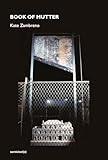2017, I resented you and your Twitter feeds, the obscenity of your news stream. The skyrocketing of petulance and greed. The normalization of hate. It was a year of half-read books: too difficult to concentrate. But books, they were also, for me, bright stars against the dark night of our political nadir. Scott McClanahan’s The Sarah Book tore a hole in my soul. A semi-autobiographical novel about the break-up of a marriage: think Scenes from a Marriage, think Who’s Afraid of Virginia Woolf? set with West Virginia as its backdrop. The sad, clever, and at times woefully misguided Scott chronicles the fallout of his marriage to Sarah, ICU nurse and self-appointed caretaker of helpless things. It’s a sad beautiful song of bleakness and alienation lined with sunbursts of tenderness and redemption.
 I loved Jess Arndt’s slender gem of a story collection, Large Animals, for its ways of seeing. Arndt’s uncanny observations give life to desire, to despair, to the smallest things. In her stories, the mundane is drawn anew—waves appear “like sandwich foil that had been crumpled up and hucked away,” a refrigerator’s shelves, like a rib cage. The embodied sensuality lies in stark contrast to the narrators’ struggles with the physical encumbrance of inhabiting a body with breasts, and fantasies and fears associated with having them surgically removed.
I loved Jess Arndt’s slender gem of a story collection, Large Animals, for its ways of seeing. Arndt’s uncanny observations give life to desire, to despair, to the smallest things. In her stories, the mundane is drawn anew—waves appear “like sandwich foil that had been crumpled up and hucked away,” a refrigerator’s shelves, like a rib cage. The embodied sensuality lies in stark contrast to the narrators’ struggles with the physical encumbrance of inhabiting a body with breasts, and fantasies and fears associated with having them surgically removed.
 I’ve spent months teasing out relationships of teenage girls in my fiction, and sought out other fictions that depict the young girl with complexity: their surly, backbiting, tender, loyal, and vulnerable ways, the ferocity of their attachments. Megan Abbott’s Dare Me did this brilliantly well; I am loath to admit I so enjoyed a book about a team of high school cheerleaders, but, oh, I did. The girls are drawn with such intelligence and wit.
I’ve spent months teasing out relationships of teenage girls in my fiction, and sought out other fictions that depict the young girl with complexity: their surly, backbiting, tender, loyal, and vulnerable ways, the ferocity of their attachments. Megan Abbott’s Dare Me did this brilliantly well; I am loath to admit I so enjoyed a book about a team of high school cheerleaders, but, oh, I did. The girls are drawn with such intelligence and wit.


 Edith-May, loner and protagonist of Coco Picard’s graphic novel Chronicles of Fortune would hate cheerleaders, I imagine, as much she hates bachelorette parties, and for this (and many other reasons) I adore her. “If I have to eat a penis lollipop I’ll die,” Edith-May tells her roommates (who consist of a mountain that’s grown in her city apartment and a crocodile she took in from the roof). Edith May’s superhero alter ego comes to life after the death of her mother, though she only appears at night and suffers from ennui. Together they encounter ghosts and healers and moth populations and find ways to grieve. Kate Zambreno’s powerful, lyric processing of her mother’s death in Book of Mutter is an artful encomium and stunning homage of a book that at its center conjures Samuel Beckett: “I can’t go on, I’ll go on.” I’m in awe of Vivian Gornick as a thinker and reader and of her powers of observation with regard to the city (New York) and of her love/hate relationship with her mother in Fierce Attachments. I’m still not over Patrick Cottrell’s beautiful and devastating Sorry to Disrupt the Peace, whose narrator returns home after her brother’s suicide in an attempt to piece together his reasons and instead finds her parents inhospitable and in denial. And last in this line of loss is the first Elena Ferrante I’ve read—Days of Abandonment—consumed in what now seems like a prolonged summer haze.
Edith-May, loner and protagonist of Coco Picard’s graphic novel Chronicles of Fortune would hate cheerleaders, I imagine, as much she hates bachelorette parties, and for this (and many other reasons) I adore her. “If I have to eat a penis lollipop I’ll die,” Edith-May tells her roommates (who consist of a mountain that’s grown in her city apartment and a crocodile she took in from the roof). Edith May’s superhero alter ego comes to life after the death of her mother, though she only appears at night and suffers from ennui. Together they encounter ghosts and healers and moth populations and find ways to grieve. Kate Zambreno’s powerful, lyric processing of her mother’s death in Book of Mutter is an artful encomium and stunning homage of a book that at its center conjures Samuel Beckett: “I can’t go on, I’ll go on.” I’m in awe of Vivian Gornick as a thinker and reader and of her powers of observation with regard to the city (New York) and of her love/hate relationship with her mother in Fierce Attachments. I’m still not over Patrick Cottrell’s beautiful and devastating Sorry to Disrupt the Peace, whose narrator returns home after her brother’s suicide in an attempt to piece together his reasons and instead finds her parents inhospitable and in denial. And last in this line of loss is the first Elena Ferrante I’ve read—Days of Abandonment—consumed in what now seems like a prolonged summer haze.

 Deepak Unnikrishnan’s Temporary People is a brilliant book of interlinked stories that revel in wordplay, and that depict the lives of temporary workers in the UAE and their families and their interchangeable identities in the eyes of the state. In contrast, these characters are so vivid on the page—a woman tapes together workers who have fallen from tops of buildings; a son throws his grandfather’s ashes into a river; a suitcase sprouts legs, a man devours, and in devouring, becomes a plane. Dispensability is key, too, in Jenny Erpenbeck’s Go, Went, Gone, which tracks a group of refugees housed in Berlin through the vantage point of their tutor, a recently retired college professor. We see Richard’s privileged life and its relative continuity (despite the fall of the Berlin Wall), his companionship of friends who are like family and have grown old with him, and the stark contrast this poses to the lives of the refugees he befriends and attempts to help. They’re survivors of genocide and oppression who escaped via harrowing journeys. They are subject to bureaucracy without rights, subject to prejudice against their skin color and origins, shuffled at the whims of the state, condemned for the burden they pose while not being allowed to work or to settle there. The disregard for the men’s lives is staggering—as is their suffering, the ways state’s intercession only perpetuates the shuffle and undercuts their humanity. Go, Went Gone, is an important book. It’s impossible to read and not take a long, hard look at how we’re all implicated.
Deepak Unnikrishnan’s Temporary People is a brilliant book of interlinked stories that revel in wordplay, and that depict the lives of temporary workers in the UAE and their families and their interchangeable identities in the eyes of the state. In contrast, these characters are so vivid on the page—a woman tapes together workers who have fallen from tops of buildings; a son throws his grandfather’s ashes into a river; a suitcase sprouts legs, a man devours, and in devouring, becomes a plane. Dispensability is key, too, in Jenny Erpenbeck’s Go, Went, Gone, which tracks a group of refugees housed in Berlin through the vantage point of their tutor, a recently retired college professor. We see Richard’s privileged life and its relative continuity (despite the fall of the Berlin Wall), his companionship of friends who are like family and have grown old with him, and the stark contrast this poses to the lives of the refugees he befriends and attempts to help. They’re survivors of genocide and oppression who escaped via harrowing journeys. They are subject to bureaucracy without rights, subject to prejudice against their skin color and origins, shuffled at the whims of the state, condemned for the burden they pose while not being allowed to work or to settle there. The disregard for the men’s lives is staggering—as is their suffering, the ways state’s intercession only perpetuates the shuffle and undercuts their humanity. Go, Went Gone, is an important book. It’s impossible to read and not take a long, hard look at how we’re all implicated.
More from A Year in Reading 2017
Don’t miss: A Year in Reading 2016, 2015, 2014, 2013, 2012, 2011, 2010, 2009, 2008, 2007, 2006, 2005









